Search Results
Showing results 1 to 18 of 18

Battleships: Searching Algorithms
Source Institutions
This activity explores the main algorithms that are used as the basis for searching on computers, using different variations on the game of battleships.
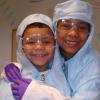
Tiny Particles, Big Trouble!
Source Institutions
In this activity, learners discover why some nanoscale science and technology is done in the controlled environment of a clean room, what clean rooms are like, and how scientists help keep the clean r

Exploring Materials: Liquid Crystals
Source Institutions
In this activity, learners discover that the way a material behaves on the macroscale is affected by its structure on the nanoscale.

Whose Fault Is It?
Source Institutions
In this seismic simulation, learners play a "who-dunnit" game to explore earthquakes.
Finding the Right Crater
Source Institutions
This quick demonstration (on page 11 of PDF) allows learners to understand why scientists think water ice could remain frozen in always-dark craters at the poles of the Moon.

Aerogel
Source Institutions
This activity/demo introduces learners to aerogel, a glass nanofoam. Learners discover how aerogel is made and how well it insulates as well as learn about aerogel's other unique properties.
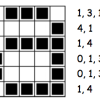
Colour by Numbers: Image Representation
Source Institutions
This activity shows learners how computers use numbers to represent pictures. A grid is used to represent the pixels (short for picture elements) of a computer screen.
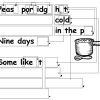
You Can Say That Again!: Text Compression
Source Institutions
This activity helps students learn how computers "compress" text by identifying repeating patterns of letters, words, and phrases.
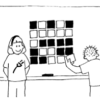
Card Flip Magic: Error Detection & Correction
Source Institutions
This magic trick is based on how computers detect and correct data errors.

Heart of the Matter
Source Institutions
In this activity, learners explore the concept of valve operation and how engineers have adapted valves for use in mechanical heart valve design.
Waves: An Alternative Energy Source
Source Institutions
In this data analysis and environmental science activity, learners evaluate the feasibility of wave energy as a practical alternative energy source using ocean observing system (OOS) buoys.

Lotus Leaf Effect
Source Institutions
This is a demonstration about how nature inspires nanotechnology. It is easily adapted into a hands-on activity for an individual or groups.

Exploring Fabrication: Self-Assembly
Source Institutions
In this activity, learners participate in several full-body interactive games to model the process of self-assembly in nature and nanotechnology.
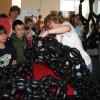
Balloon Nanotubes Tabletop
Source Institutions
This activity introduces learners to the structure and properties of carbon nanotubes.

Artificial Intelligence: The Intelligent Piece of Paper
Source Institutions
This activity explores what it means for a computer to be intelligent and introduces the topic of what a computer program is and how everything computers do simply involves following instructions writ
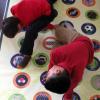
Exploring Size: StretchAbility
Source Institutions
In this game, learners explore the different sizes of things in the world. In this Twister-like game, learners must place a hand or foot on a circle of the right scale - macro, micro, or nano.

Information Hiding: Sharing Secrets
Source Institutions
This activity about cryptographic techniques illustrates a situation where information is shared, and yet none of it is revealed.

Exploring Forces: Gravity
Source Institutions
In this nanoscience activity, learners discover that it's easy to pour water out of a regular-sized cup, but not out of a miniature cup.
